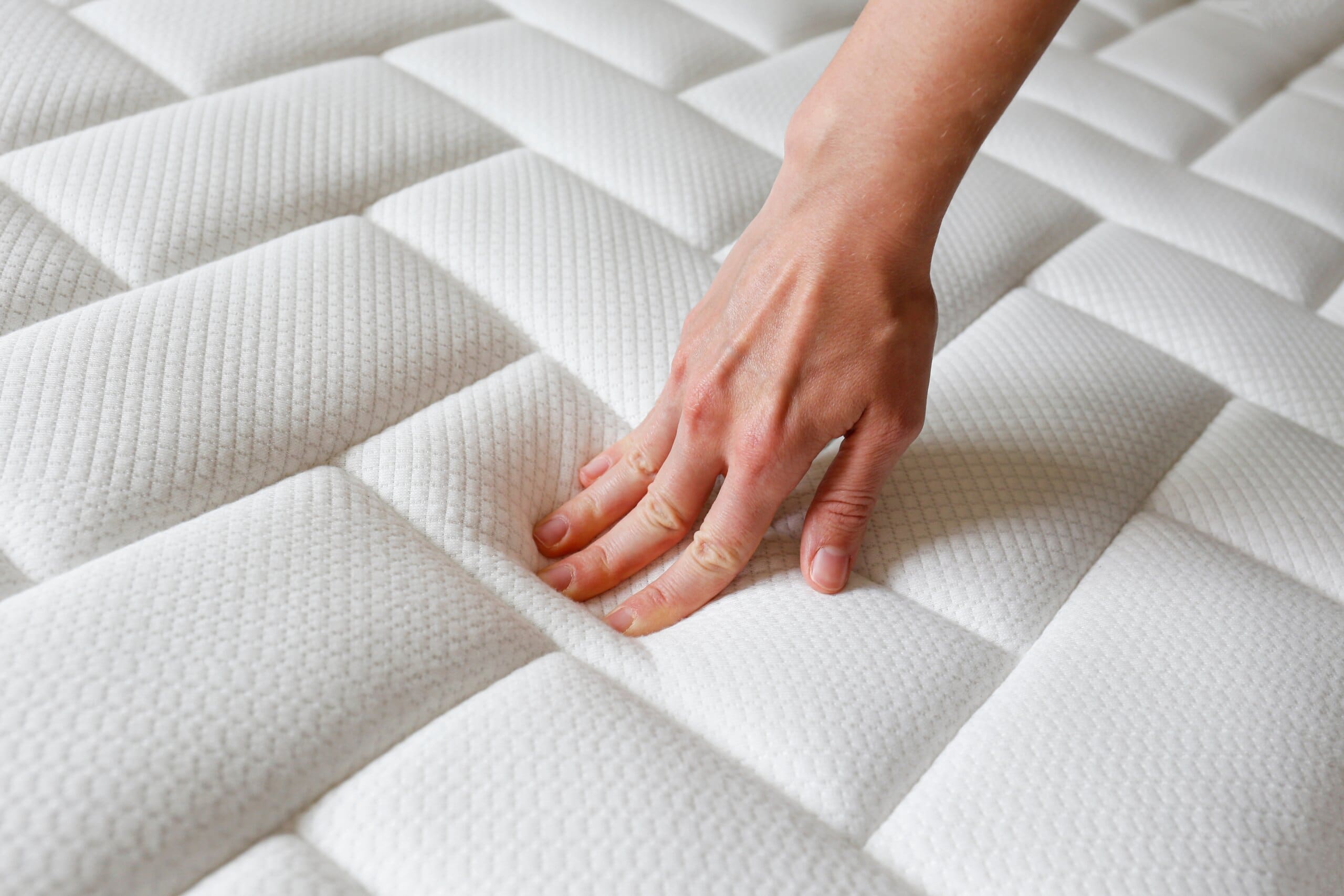How To Make A Soft Mattress Firmer
Learn how to firm up your mattress if it's starting to feel too soft for your liking.
Whether you’re a back sleeper, a front sleeper, or somewhere in between, we all have our own preferences when it comes to mattress firmness. For a lot of us, a soft mattress can be preferable to a firm mattress, especially if you’re seeking that comforting ‘sink into bed’ sensation every time you turn in.
However, it turns out there is such a thing as too soft a mattress.
Indeed, no matter how hard you try, even the firmest mattress will soften over time, eventually losing its all-important support and making for an uncomfortable night’s rest if you don’t move to replace it – simply put, no mattress lasts forever.
But if you’ve found that your mattress is too soft for your liking, is there anything you can do to firm it up before buying a new one, and is there anything you can do to add support to a new mattress that’s too soft?
Keep reading for our top tips and advice on how to make a soft mattress firmer, and how to tell when a mattress that’s too soft might need replacing!

What causes mattresses to soften?
As we’ve already noted, the main reason why all mattresses eventually soften is time. Continual everyday use, fluctuations in bedroom temperature and moisture, and movement in and out of bed all contribute to regular mattress wear and tear, typically taking the form of your mattress’s filling losing its supportive nature.
However, time and environmental factors like these are not the only factors that cause mattress softening. For example, mattresses made from cheap materials will almost always lose their supportive firmness faster, and if you’re a larger individual sleeping on a soft mattress, you’ll likely notice a reduction in firmness far sooner than expected.
Some compression in your mattress is completely normal and actually beneficial. If you have a foam mattress, you'll likely know that it's designed to mould to your body over time. By learning the unique curvature of your body, it softens with help from your natural warmth and gently compresses over time. However, a 'dip' of over 2 inches is said to be more than just natural compression, and you should consider whether your mattress has actually started to sag.
Is a soft mattress bad for your back?
For the most part, a well-constructed soft mattress should not cause any back issues while sleeping. For many sleepers, especially side-sleepers, a soft mattress helps to provide good spinal alignment and sleeping posture throughout the night, minimising or eliminating back aches, making them one of the best types of mattress for back pain.
But, with that being said, a mattress that is too soft can cause a misalignment of your spine, resulting in general discomfort when sleeping and affecting your joints and posture – in other words, it really depends on how soft your mattress is. If you're looking for serious support to your spine, you might want to consider a firmer, orthopaedic mattress instead.

“Is my mattress too soft?”: How to tell
If you think your mattress might be too soft, but you’re unsure, there are a few key signs you can look for which may hint that your mattress isn’t as firm as it should be, such as:
- Bodily stiffness – if you wake up with a stiff body, then it’s a good sign that you’re not getting enough support while asleep.
- Back, neck, and shoulder pain – similar to body stiffness, if you’re waking up with regular back, neck, or shoulder pain, and you have good pillows, then it’s almost certain that your mattress is too soft for you.
- Difficulty getting comfortable – if you find that you struggle to get comfortable in bed and tend to toss and turn, this might be because your mattress lacks firmness, preventing your muscles from relaxing properly in order to sleep.
- Difficulty changing sleeping positions – in contrast to tossing and turning, if you find you want to move but struggle to do so because of your mattress’s sagging shape, it’s a sure sign that it’s too soft.
- Difficulty getting out of bed – for most of us, getting out of bed in the morning should not pose an issue. However, those with a mattress lacking in support may find themselves sinking too much into their bed when sitting upright, making getting up harder than it should be.
How to firm up a soft mattress
So, now that you know what causes a mattress to soften and signs to watch out for, let’s look at some top tips for how to firm up a soft mattress.
Below are our core pieces of advice on how to make a soft mattress harder:
1. Air out your mattress
To start with, there’s a chance your mattress is sagging due to high room humidity or temperature. If this is the case, then you’ll want to thoroughly air your mattress out. This will allow its filling to dry properly, helping it to recover a degree of firmness and increasing support.
Of course, this is only a temporary solution, and you may need to find ways to reduce your bedroom’s humidity and temperature going forward. Otherwise, you likely find your mattress softening once again before too long.
2. Tighten your bedsheets
While it might not seem like this will provide much additional support, tighter mattress bedding that’s tucked in correctly at the corners will straighten your sheets and mattress out. This in turn will provide a greater level of rigidity to your mattress, helping it to stay in shape for longer.
3. Flip or rotate your mattress
Pretty much every mattress will need flipping or rotating on a regular basis to ensure its filling remains evenly distributed for consistent firmness. So, if you haven’t already, check your mattress guide for information on whether it needs flipping or rotating and then include this into your bed maintenance routine as often as necessary.
4. Invest in a mattress topper
Perhaps the most popular method for improving the firmness of a soft mattress, a high-quality mattress topper can go a long way towards adding additional bed support. Mattress toppers themselves come with different firmness and filling ratings, so make sure you take the time to research them properly to find one that matches your sleep needs.
5. Place a plywood board between your mattress and bed frame
Sometimes, it might not be your mattress that’s lacking support, but your bed frame instead. For a temporary solution, you could add a thin plywood board between your mattress and bed frame.
Doing this will add a solid layer to your bed frame, ensuring your mattress is fully supported and minimising mattress dipping and softening until you buy a new bed.
6. Replace your bed frame
Finally, if you’d rather not rely on a temporary solution and feel that your mattress still has a few years of life left in it, then, by all means, start searching for a replacement bed frame as soon as you can.
Depending on your mattress, you may prefer using a divan bed or wooden bed frame, but regardless, a brand-new bed frame is sure to add much-needed support to a softening mattress.
Of course, if you feel both your mattress and bed frame need replacing, you could consider a divan and mattress set, which will upgrade your entire sleep set-up in one easy move.
Should you buy a new mattress if your mattress is too soft?
If you’ve tried all of our above tips to try and firm up your mattress, and you’re still finding it’s too soft, then chances are that you’re going to need to buy a new mattress to replace your old one.
Naturally, if you’ve not had to buy a new mattress in a while, you might not be sure where to start, which is why we recommend turning to our ultimate mattress-buying guide for tips and advice on how to find the right bed for your preferred sleeping style. You can even try our MattressFinder quiz, which after a few simple questions will pair you up with a few perfect mattress options for you.
Find your new mattress in our range
With all our points covered, you should now have a much better idea of how to make a soft mattress harder. While many of our suggestions may seem like temporary solutions to buying a new mattress, if you’re on a tight budget, then they can certainly help to re-firm your mattress for several months to come.
If you've got the opposite problem, and need to soften a mattress that's too firm, check out our guide to softening memory foam mattresses and pillows.
Even if you’re on a budget when it comes to mattress buying, that’s no reason not to start browsing the MattressnextDay range today! From bed and mattress combination deals to exceptional discounts on top bed brands, you’ll be surprised to see just what we have on offer in our collection. Get in touch today to find out more and ask about our free and next-day delivery options. And don’t forget to visit our Snooze News sleep blog and buying guide hub for more sleep tips and information on getting your perfect night's sleep.







